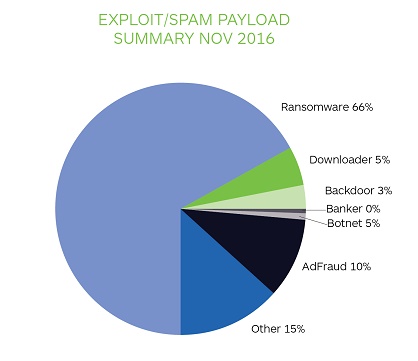Europe is the most malware-impacted continent says a new study into cybersecurity by Malwarebytes. Examining data from more than 200 countries and almost one billion total malware detections / incidences between June 2016 and November 2016, it found that Ransomware became a favourite attack methodology used against businesses in the US and Europe, and that ad fraud has also emerged as a primary threat, at times outpacing ransomware.
Europe saw 20 percent more infections than North America and 17 times more than Oceania. The countries hit hardest by malware in Europe are France, the UK, and Spain—although the Vatican City saw the steepest rise with a 1,200 percent increase in all malware. The UK saw almost twice as many incidents as Russia, and Russia was not in the top 10 of countries hit by ransomware, despite its size and population.
To better understand just how drastically the threat landscape evolved in 2016, Malwarebytes examined data taken from Windows and Android devices running Malwarebytes in more than 200 countries. Both corporate and consumer environments were studied and data was collected from June 2016 through November 2016. In the six months studied, nearly 1 billion total malware detections/incidences were reported. Data was also obtained from Malwarebytes’ internal honeypots and collection efforts to identify malware distribution, not only infection.

“To protect users from cybercriminals, we need to intimately understand their methodologies and tactics,” said Marcin Kleczynski, Malwarebytes CEO. “Our findings demonstrate that the frequency and variety of new cyberattacks has crashed into people and businesses at an alarming rate. The last year involved an onslaught of ransomware, a surge of pernicious ad fraud and new, dangerous uses for botnets. These threats have the potential to erode many of the gains that computing is providing global society. Both consumers and businesses need to better understand how these new attack methodologies may impact them.”